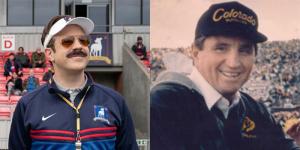Spoiler Alert: This article works with cultural memes and identity politics from the most recent episode of Ted Lasso. If you haven’t watched it and you love the show, you may wish to read this article after viewing the episode.
The wildly popular AppleTV+ show, Ted Lasso, has continued to escalate its identity politics message during season 3. Its most recent episode 9, La Locker Room Aux Folles, has AFC Richmond continue its resurgent winning streak, many thanks to the success of its open football strategy. But in this episode’s featured game, Team Captain Isaac McAdoo and teammate Colin Hughes are as out of sync on the field as they are in real life.
After blowing a big play, as the official called for the half, one fan abusively yells at the team. Since the abusive language was derogatory to same-sex relationships, this triggers Captain McAdoo, who jumps into the stands and physically confronts the fan. McAdoo is issued a red card and ejected from the game.
What triggered Captain McAdoo? The same underlying cause for his tension with team-mate Hughes triggered him. After having seen a private photo on Hughes’ phone in the last episode, Captain McAdoo became aware of teammate Hughes’ secret. He is a homosexual. This new awareness is what has complicated their friendship off the field and now their game-play on the field.
Of course, the team coaches have to address McAdoo’s altercation and ejection from the game before returning to play the second half. In the locker-room, Coach Lasso asked what’s the deal. That’s when McAdoo’s feelings become known. Without betraying Hughes’ secret, McAdoo declares he was advocating for the humanity and dignity of any teammates, who might be homosexuals.
After McAdoo storms out of the locker room to process his feelings, Hughes’ resolves his teammates speculation with his moment. He makes his self known to his teammates. Once his homosexual identity is known, his teammates affirm him saying they don’t care that he is gay.
This is when Coach Lasso interjects with his sage leadership and pivots the language to affirm that, in fact, they all care about Hughes’ identity; his identity does matter to them. Lasso goes on to deliver a parable about a time he didn’t care about the fact that his friend was a devoted Denver Broncos fan. The moral of Lasso’s parable is to be an affirming and caring friend and teammate.
But, as with any good parable, Assistant Coach Roy Kent skillfully frames the centerpiece question of the parable: “Who are the Denver Broncos?” Unlike the Prophet Nathan, who declared to David: “You are that man,” Coach Lasso lets Kent’s question linger by dismissing the importance of its answer. However, I think it does matter, but let’s go ahead and also let that question linger for a moment.
The second half commences. Even with one player down for the last 45 minutes of official play, AFC Richmond rallies for a come behind 2 over 1 victory, with two assists from Hughes, who has realized his fullest self on the field after making his full self known to his teammates in the locker room.
Coach Roy Kent stands in for Coach Lasso to lead his first post-game press conference and fields the question pertaining to the mid-game altercation, with a moving response, on behalf of the team and Captain McAdoo. The episode closes with McAdoo and Hughes reconciling and then playing a friendly game of football, the global sport, on a gaming system.
But who are the Denver Broncos?
Coach Bill McCartney and Identity Politics in Denver, Circa 1992/93
I think the writers of the show wrote this episode to typify and reimagine events that happened almost exactly 30 years ago in Denver, Colorado. Sure. Like any typology it’s not going to be precise. In fact, it might have been a little bit too on the nose if the writers said that Lasso’s friend was a University of Colorado Buffs fan.
But hear me out.
Coach Bill McCartney took over leadership of the University of Colorado Buffs in 1982 to turn around a losing team and lead them to co-reign with Georgia Tech in 1990 as the NCAA national champions. Okay. That fits the trope of Ted Lasso’s coaching history. But what about identity politics?
A March 1992 LA Times article sheds light on this connection:
Bill McCartney, who became a hero for turning around a losing football team at Colorado, is being jeered for using his title and popularity to preach evangelical Christian views against homosexuality.
Coach McCartney not only coached great sports ball, but he was a former Roman Catholic turned evangelical, who in 1989 became a member of the Vineyard Christian Fellowship, located in Longmont, and he founded Promise Keepers ministries in 1990. He then used his famed status as a football coach to lobby for evangelical, moral majority identity politics in Denver, Colorado.
Denver became one of the battlegrounds for gay rights in the early 1990s. Local evangelical laymen and political lobbyists mobilized to resist homosexual activism by forming Colorado for Family Values. These men drafted an amendment, called Amendment 2, intended to restrict gay rights. State legislature passed the amendment in November of 1992.
A January 1993, CT Magazine article documents this history:
Colorado has become the site for the latest showdown over homosexual rights. On November 3 Colorado voters narrowly passed the controversial Amendment 2, which prohibits laws protecting homosexuals from discrimination based on sexual orientation. But the firestorm over the amendment shows no sign of dying down.
The Colorado Springs-based Colorado for Family Values, which is led by three Christian laymen, wrote the amendment and successfully placed it on the November ballot through a petition drive that focused on the state’s churches.
While the article does not say that Coach McCartney is one of those laymen who drafted the amendment, we do know that the now winning coach stepped up as the key public spokesperson and exercised his rights of free-speech on behalf of evangelical-fundamentalists lobbying for the amendment in Denver. He used his platform with the press to publicly condemn homosexuality and homosexual rights.
News about his political activism became widespread through various national news presses, including the Chicago Tribune, New York Times, and the LA Times.
The March 15, 1992, New York Times article begins:
The University of Colorado’s president can walk down the street and scarcely be recognized. The school’s top professors are still more anonymous. But the football coach, Bill McCartney, is famous.
As the man who has built a football powerhouse here, Mr. McCartney’s statements — about sports or anything else — have a wide and receptive audience. Mr. McCartney has lately been speaking about homosexuality, which he has called “an abomination.” And he has lent his name to a group that seeks to limit gay rights.
His remarks, which have spurred angry protests on campus, raise a thorny question for university administrators. Is Mr. McCartney simply exercising his right to free speech? Or is he using his university post, not to mention his winning football team, to give credence to a political agenda?
At a news conference, Mr. McCartney complained that homosexuals are “a group of people who don’t reproduce yet want to be compared to people who do.”
The coach is serving on the advisory board of Colorado for Family Values, which is petitioning for a state constitutional limit on gay rights.
Coach McCartney’s activism on behalf of family values had short-term gains, but the backlash from the public added to the mounting body of evidence that the moral majority’s political influence was eroding.
Less than a year after Amendment 2 passed in Colorado, the New-Democrat President, Bill Clinton, announced and led the way for congress to pass “Don’t Ask, Don’t Tell” legislation for the United States Armed Forces.
Only a few years later, the US Supreme Court case Romer v. Evans (517 U.S. 620, 1996) struck down Colorado’s Amendment 2 legislation, ruling in a 6–3 decision that Amendment 2 did not meet the normal test of compliance for the Equal Protection Clause. Supreme Court Justice Kennedy wrote the majority opinion and was joined by Stevens, O’Connor, Souter, Ginsburg, and Breyer. This ruling paved the way, ultimately, to the 2015, Obergefell v. Hodges ruling that the Due Process Clause and Equal Protection Clause guarantee same-sex couples the fundamental right to marry.
As the political influence of moral majority evangelicals eroded across time, Coach Bill McCartney recognized that he needed to pivot his activist strategy to an apolitical energy. Perhaps feeling the public spite for his Amendment 2 lobbying, McCartney turned his attention away from political activism and put his evangelical energy towards helping men.
He traded his political persona for the figurehead role of Promise Keepers, the organization he founded back in 1990, which primarily organized a national speaking and worship conference tour for men. The conference tour encouraged men to be biblical men of God. Promise Keepers not only aspired to help men be better husbands and fathers, but it aimed for sons to grow up to be like their fathers.
Fundamentally, one consequential feature of this grassroots effort to cultivate biblical manhood was to keep men straight, so they could keep generating straight men. One might say that as McCartney watched the political soil erode beneath his feet, he set out to find new soil to plant his seed.
McCartney’s time with the Buffs concluded in 1994, so he devoted his full attention to the flourishing of the Promise Keepers movement.
But just over a year after the May 1996 Romer v. Evans ruling, Coach McCartney’s rigid opposition to same-sex people eroded. A June 1997 New York Times article records his ground shifting yet again:
He addressed another issue that has dogged him and Promise Keepers, which avows it is apolitical, since McCartney voiced his support for the Colorado anti-gay amendment, which was later declared unconstitutional. He has called homosexuality ”an abomination,” but yesterday he said gay men are welcome in Promise Keepers along with everyone else, though he has not exactly changed his opinion.
Thirty years have now passed since Coach Bill McCartney used his platform to condemn same-sex relationships. We have witnessed the whole arch of the story of the ascent of same-sex rights and the erosion and eclipse of evangelical political power.
Some have witnessed the whole arch of TV series, like Schitt’s Creek, whose storyline conveys its view of identity politics. Now we are seeing how Ted Lasso marshals visual arts to normalize and solidify cultural reception of same-sex relationships—as well as tackle other cultural phenomena like divorce, sex-trafficking, glass ceilings for women, and racial discrimination.
But how are evangelicals receiving this message? I’ve chatted with sincere Christians at my church, Christ Church in Oak Brook, about both these shows. I’ve found that fundamentalist leaning evangelical friends at church have admitted that both shows lost them from their viewing audiences around the time identity politics became the centerpiece to the storylines. As sneaky as these shows are at developing winsome characters and binge-worthy plotlines, before introducing identity politics, evangelicals have trained themselves to anticipate how these shows’ storylines create worldviews that contend against their own. As they see these shows’ attempts to erode their worldview, they shift away to find solid ground again.
I think, though, this is the first time I’ve witnessed an overt reproach to evangelical history and a reimagination of how contingent characters in evangelical history might have acted. Is Ted Lasso the truer and better Bill McCartney? What do you think?


















